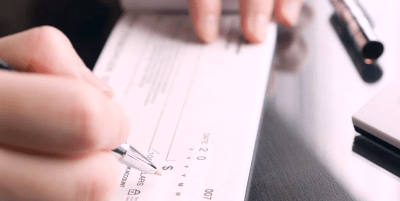- Lemberg Law
- FDCPA – Debt & Credit Complaints
- Debt Collection FAQ’s
- Is a Debt Collector Asking You To Pay With A Postdated Check?

Under 15 U.S.C. Section 1692f, using “unfair or unconscionable means” to collect a debt is illegal. It enumerates three activities pertaining to postdated checks:
1692f(2): The acceptance by a debt collector from any person of a check or other payment instrument postdated by more than five days unless such person is notified in writing of the debt collector’s intent to deposit such check or instrument not more than ten nor less than three business days prior to such deposit.
1692f(3): The solicitation by a debt collector of any postdated check or other postdated payment instrument for the purpose of threatening or instituting criminal prosecution.
1692f(4): Depositing or threatening to deposit any postdated check or other postdated payment instrument prior to the date on such check or instrument.
Can a Debt Collector Suggest that I Postdate a Check?
There are three provisions of the Fair Debt Collection Practices Act (FDCPA) that address the issue of postdated checks, but the bottom line is that it is legal for a debt collector to suggest that you provide a postdated check. Under 15 U.S.C. Section 1692f(2), if the check is dated more than five days in advance of the date you submit it, then the debt collector must give you three to ten business days’ notice that they’re going to deposit your check. In other words, if on June 1 you give the debt collector a check postdated to June 15, and the debt collector plans to deposit the check on June 15, then they need to send you a notification that they intend to do so between June 5 and June 12.
It’s important to note that this provision applies to physical checks, but also to preauthorized checks and electronic money transfers.
In Harris v. Atlantic Credit & Finance (U.S. District Court, Middle District of North Carolina, 1:18-cv-00270), a case that was ultimately settled out of court, the plaintiff said that she agreed to allow the debt collector to initiate an electronic funds transfer from her checking account every two weeks and gave them her bank account information. She alleged that the debt collector notified her more well in advance of withdrawing money from her account, violating the ten-day maximum outlined by the FDCPA.
If the debt collector deposits your postdated check prior to the date you wrote on the check – or threatens to deposit it – that is a violation of a different part of the FDCPA, namely Section 1692f(4).
Can a Debt Collector Make Me Provide a Postdated Check by Threatening Me?
Under 15 U.S.C. Section 1692f(3), a debt collector can’t intimidate you into giving them a postdated check or threaten you with criminal prosecution if your check bounces. One example of this is a debt collector pressuring you to send a postdated check when they don’t know whether or not you have funds in your account to cover the check. Then, when the debt collector receives the check, they intimidate you into covering that check rather than your other financial obligations by threatening to turn you over to prosecutors for violating check kiting laws.
It can be difficult to prove that you were threatened or intimidated. Fair debt attorneys who represent consumers in FDCPA lawsuits can prove a pattern of threatening calls or letters, or demonstrate that the debt collector has a track record of turning consumers in for writing postdated checks with insufficient funds. The attorneys can gather that information from their clients, local criminal prosecutions, and discussions with prosecutors.
Have You Been Asked By A Debt Collector To Postdate A Payment Check? Know Your Rights
If you’ve provided a debt collector with postdated checks or an authorization to withdraw money from your account and they haven’t provided you with timely, legally-mandated notices, Lemberg Law can help. Under the FDCPA, you can sue the debt collector and recover $1,000, along with your attorney fees and court costs.
Lemberg Law attorneys protect consumers from abusive debt collection agencies. If you are receiving unwanted collection calls at work, then you could have a case against the collection agency. Contact Lemberg Law at 844-685-9200 ☎ or complete our online form for a no-cost, no-obligation consultation.
Have questions? Call us now at 844-685-9200 for a Free Case Evaluation.
Our services are absolutely FREE to you.
The harassing company pays our fees.
